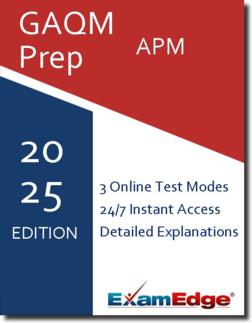GAQM APM (APM) Practice Tests & Test Prep by Exam Edge - Blogs
Based on 32 Reviews
- Real Exam Simulation: Timed questions and matching content build comfort for your GAQM APM test day.
- Instant, 24/7 Access: Web-based GAQM Associate In Project Management practice exams with no software needed.
- Clear Explanations: Step-by-step answers and explanations for your GAQM exam to strengthen understanding.
- Boosted Confidence: Reduces anxiety and improves test-taking skills to ace your GAQM Associate In Project Management (APM).



